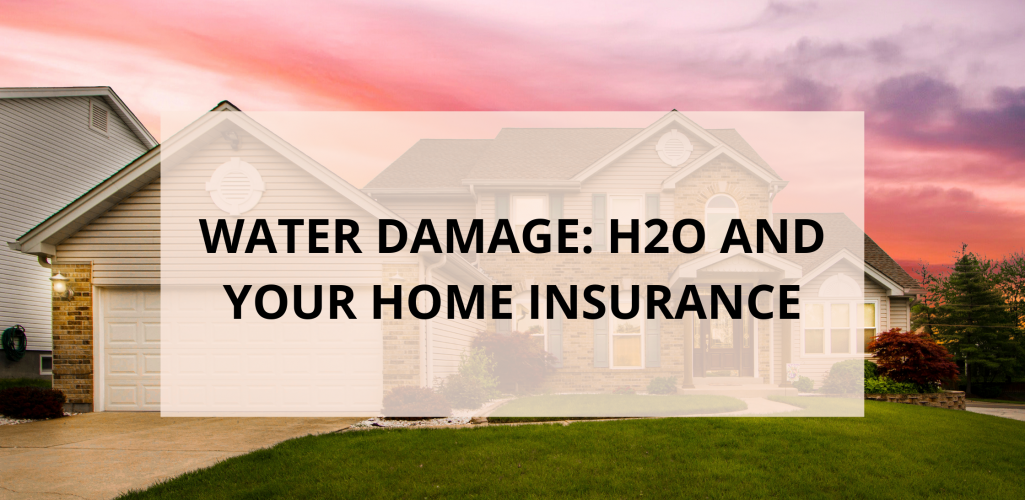Water – everyone needs it, but maybe not in the middle of your home! Besides hail and wind damage, water damage is the most common home insurance claim. Wherever you live, you want to have peace of mind about your home’s protection. Get the full scoop on H2O in your home!
Water Damage Factors
There is an endless number of possibilities when it comes to home insurance claims due to water damage. However, whether your insurance covers the damages depends on a few key factors.
Source of the Damage
Water damage can come from many different areas of the home. If the water damage is from the inside of the house, like a broken pipe, you are usually covered. Likewise, roof leaks are generally covered. However, you won’t be protected if the flood originates from the outside of your home. To be covered for this type of water damage, you would need to have a separate flood policy on your home.
Policy Type
When you are shopping for your home insurance, make sure you know exactly what kind of water damage is covered on your home or renter’s policy. Depending on your house, you may need an optional coverage called ‘water and sewer backup’. This is insurance protection for instances where your sump pump breaks down or a sewer clogs. Given how often water damage occurs, we highly recommend including water and sewer backup coverage on your homeowner’s policy.
The Type of Damage: Sudden and accidental vs. gradual
Typically, home insurance policies will not protect you against gradual damage, also known as “wear and tear.” Since gradual damage is caused by inattention or poor maintenance, most insurance providers will not cover it.
There are many types of gradual damage:
- Leaky pipes or faucets that weren’t addressed and caused damage to the house’s walls and floors
- Water that comes from any foundational cracks
- Roof shingles that are worsening and allow rain to seep in
Your home insurance usually will cover certain scenarios that are sudden and accidental. Let’s say that there was another ice storm in Springdale, Arkansas, and the freezing temperatures caused a pipe to burst and flood your home. Instances like this are sudden and accidental, so most homeowner’s insurance policies will protect you.
Water damage that is generally covered includes:
- Plumbing issues, including frozen pipes that burst
- The overflow of an appliance, such as a toilet, dishwasher, washing machine, and water heater
- Damage caused by a fire extinguisher or hose used to extinguish a fire
To make sure you are better protected, consult your insurance advisor to review the water damage coverage included in your insurance policy.
Types of Water Damage Generally Not Covered By Home Insurance
While gradual damage is one scenario that is usually not covered by home insurance, other situations may not be included in your insurance coverage.
Water backup from an outside sewer
If you have water that seeps into the home from outside, it usually is not protected by a home insurance policy. To better protect yourself, you can add the optional coverage called ‘water and sewer backup’.
Flooding
A flood beginning from the outside of your home, which is considered water damage from a natural source, is rarely covered by a homeowner’s insurance policy. If you live in a designated flood zone, you can add a flood insurance policy for your home. Also, if you live near an overflowing creek or pond or a steep hill prone to running water, you should consider having some type of flood policy on your home.
The source of the water damage
Imagine this: you enjoy a nice home-cooked meal, clean the kitchen, start the dishwasher, and head off to bed feeling great about the amazing dinner you made all by yourself. When you get up in the morning, you’re met with standing water throughout your entire kitchen after your dishwasher malfunctioned in the middle of the night. This isn’t a situation you ever want to be in! However, although your policy will cover water damage caused by the dishwasher, it won’t cover the actual dishwasher itself.
Negligence
Even if you are in a situation that seems like a sudden and accidental scenario, your water damage claim could still be denied if you did not perform the proper maintenance. For example, if your water heater explodes, but you did not do the necessary upkeep, you can be denied your claim. Or, if your pipe bursts and floods your home, this is a common home claim that is approved. However, if you did not have your home properly heated, then your insurance provider can reject your claim.
The best way to be fully protected is to have the proper insurance for your situation and ensure the home is being maintained.
Mold and Your Home Insurance
Like water damage, mold is possibly covered by your home insurance policy if the mold did not arise from a lack of maintenance or neglect. Check your policy since mold coverage varies from insurer to insurer.
Will the renter’s insurance cover water damage?
Similar to homeowner’s insurance, renter’s insurance usually covers you in case of water damage. Your possessions are usually covered if the damage is sudden, or accidental, and the source is from inside your place. However, there is a difference between renter’s and homeowner’s insurance when it comes to water damage. The damage to the dwelling should be the responsibility of the landlord.
Whether it is a busted pipe, a flooded dishwasher, or a leaky roof in Springdale, Arkansas, insurance exists to protect you from these circumstances. To ensure you have the proper coverage, talk to an insurance advisor or get a quote today at 479-802-0086!
For any additional information, follow the link below!


